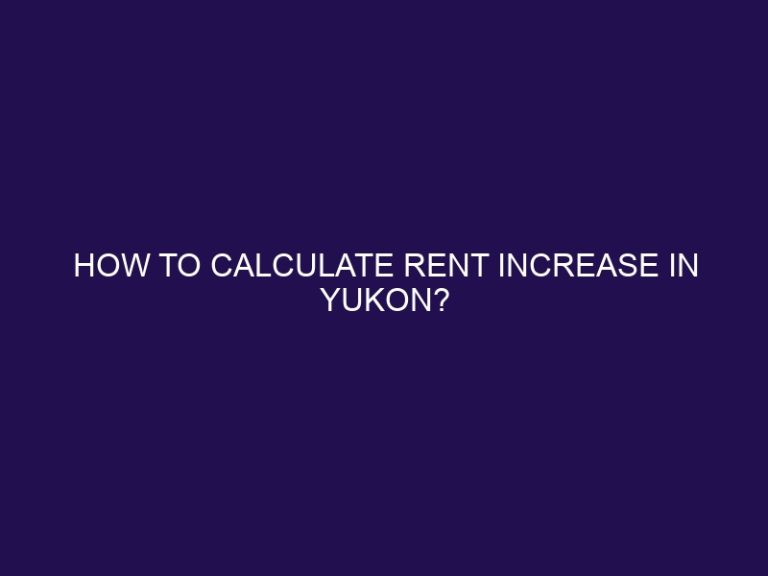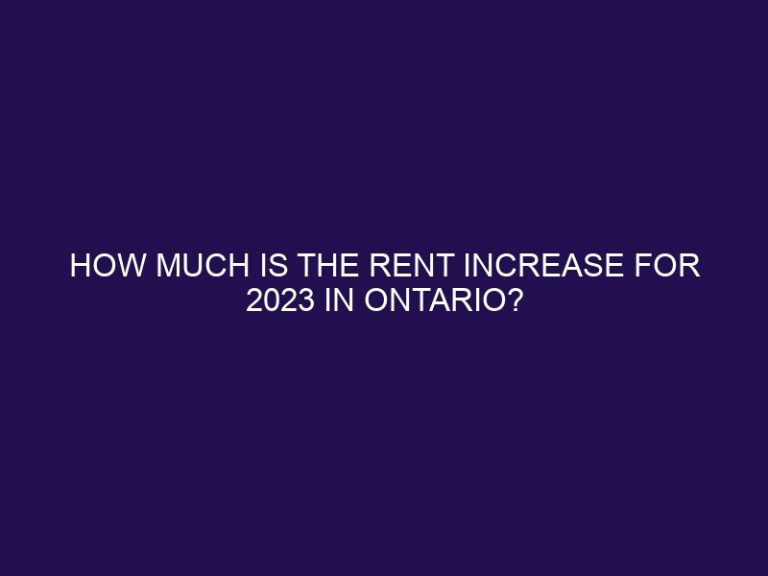What are my rights as a landlord In Manitoba?
.jpg)
Understanding your rights as a landlord is crucial when owning rental properties in Manitoba. As a landlord, it is important to be aware of your rights and responsibilities to ensure a fair and lawful renting process. This article will provide valuable information on the rights and responsibilities of landlords in Manitoba, along with insights from the Residential Tenancies Branch.
Before diving into the specific rights and responsibilities, let’s first establish what a landlord is and what it means to have landlord rights. A landlord is an individual or entity who owns a property and rents it out to tenants in exchange for a fee. Landlord rights refer to the legal privileges and protections granted to landlords to manage their properties effectively and maintain a safe and conducive living environment for tenants.
In Manitoba, landlords have certain responsibilities that must be fulfilled. These responsibilities include providing a safe and habitable property, maintaining the property, respecting tenant privacy, and ensuring fair rental practices. Understanding these obligations is essential to avoid legal issues and maintain a positive landlord-tenant relationship.
This article will cover the eviction process in Manitoba, including valid reasons for eviction, notice periods, and the rights landlords have during the eviction process. It will also address security deposits and rent increases, including regulations surrounding security deposits and guidelines for increasing rent.
Lastly, tenant disputes and conflict resolution will be discussed, providing information on mediation and arbitration services, as well as the role of the Residential Tenancies Branch in resolving disputes between landlords and tenants.
By understanding your rights and responsibilities as a landlord in Manitoba, you can navigate the rental process confidently and ensure a fair and harmonious relationship with your tenants. Let’s delve into the specifics of landlord rights and responsibilities in the following sections of this article.
Key takeaways:
- Landlord responsibilities: Landlords in Manitoba have a duty to provide safe and habitable properties, maintain the premises, respect tenant privacy, and ensure fair rental practices.
- Eviction process: Landlords can only evict tenants for valid reasons and must adhere to specific notice periods. It is essential to understand the rights and responsibilities of landlords during the eviction process.
- Security deposits and rent increases: Manitoba has regulations governing security deposits and rent increases. Landlords must comply with these guidelines to ensure they are acting fairly and legally.
What is a Landlord?
A landlord, also known as an individual or entity that owns a property and rents it out to tenants in exchange for payment, plays a crucial role in the real estate industry. So, what is a landlord? Well, a landlord is essentially someone who has certain rights and responsibilities when it comes to managing their rental property.
One of the primary responsibilities of being a landlord is ensuring that the property is safe and habitable for tenants. This means taking care of necessary repairs and maintenance to keep the property in good condition. Additionally, respecting tenant privacy is vital, and landlords should make sure to uphold this right.
Fair rental practices are another aspect that landlords must adhere to. It is essential to treat all tenants fairly and equally when it comes to rent increases and other rental-related matters. In Manitoba, landlords must also familiarize themselves with specific regulations concerning security deposits and rent increases.
In cases where disputes or conflicts arise between landlords and tenants, there are helpful mediation and arbitration services available through the Residential Tenancies Branch. These services can be utilized to resolve any issues and maintain a harmonious landlord-tenant relationship.
What are Landlord Rights?
What are Landlord Rights in Manitoba?
In Manitoba, landlord rights include the right to a safe and well-maintained property, the right to privacy when entering the rental unit, and the right to fair rental practices. Landlords also have the right to evict tenants for valid reasons and with the appropriate notice periods. Regarding security deposits, landlords must adhere to regulations, and rent increases must follow guidelines set by the Residential Tenancies Branch. In case of disputes, landlords can access mediation and arbitration services, as well as seek assistance from the Residential Tenancies Branch. Pro-tip: Familiarize yourself with the Manitoba Residential Tenancies Act to understand your rights and responsibilities as a landlord.
Landlord Responsibilities in Manitoba
As a landlord in Manitoba, it is crucial to understand your responsibilities in maintaining a safe and habitable property, respecting tenant privacy, and ensuring fair rental practices. In this section, we will explore the various facets of landlord responsibilities in Manitoba, including providing a safe and habitable property, maintaining the property, respecting tenant privacy, and upholding fair rental practices. Get ready to delve into the essential obligations every landlord must fulfill to ensure a smooth and lawful rental experience.
Providing a Safe and Habitable Property
As a landlord in Manitoba, it is essential to prioritize providing a safe and habitable property for your tenants. Here are some vital responsibilities:
- Ensuring the property meets safety standards and is free from hazards such as mold, pests, and structural issues.
- Regularly maintaining the property, including promptly repairing broken appliances, resolving plumbing issues, and addressing electrical problems.
- Respecting tenant privacy by giving proper notice before entering the rental unit, unless in emergencies.
- Following fair rental practices, which involves not discriminating against tenants based on protected characteristics.
Maintaining the Property
To effectively maintain a rental property in Manitoba, landlords must adhere to several important steps.
1. Regular inspections: It is crucial to conduct routine inspections and identify any potential issues concerning maintenance or repairs. This proactive approach allows for timely resolution and ensures tenant safety and property habitability.
2. Prompt repairs: Addressing maintenance or repair issues promptly is essential. Landlords should prioritize resolving these matters to guarantee that the property remains in a safe and habitable condition for tenants.
3. Lawn and yard maintenance: Landlords hold responsibility for maintaining the lawn, garden, and other outdoor areas of the property. This includes tasks such as snow removal and garbage disposal, ensuring a well-kept exterior environment.
4. Building upkeep: Maintaining the building’s overall condition is vital. Landlords should regularly engage in cleaning activities, perform paint touch-ups, and promptly address any structural concerns that may arise.
5. Appliance and equipment maintenance: Regularly checking and maintaining the appliances and equipment provided by the landlord is crucial. This ensures that they remain in good working condition, avoiding potential inconveniences for tenants.
6. Emergency maintenance: Landlords must provide tenants with emergency contact information for urgent maintenance needs. Promptly responding to such situations is of utmost importance to ensure tenant well-being.
7. Inspections before and after tenancy: Conducting thorough move-in and move-out inspections is necessary. This helps document the property’s condition and allows landlords to identify and address any discrepancies promptly.
Following these steps diligently enables landlords to effectively maintain their properties and provide a safe and comfortable living environment for their tenants in Manitoba.
Respecting Tenant Privacy
Respecting Tenant Privacy is an essential aspect of being a landlord in Manitoba. As a landlord, it is crucial to understand and follow the laws and regulations that govern tenant privacy rights. This entails not entering the rental property without proper notice, unless it’s an emergency situation. It is also important for landlords to refrain from discussing tenants’ personal information with others, unless explicitly permitted by the tenants or required by law. By respecting tenant privacy, landlords can establish trust and maintain a positive landlord-tenant relationship.
In a similar vein, I once encountered a situation where a tenant expressed concerns about their privacy. They discovered that a maintenance worker had entered their unit without prior notice. I immediately apologized to the tenant, emphasized the significance of respecting their privacy, and ensured that such an incident would not reoccur. This occurrence served as a valuable reminder for me to consistently prioritize and respect tenant privacy in my role as a landlord.
Ensuring Fair Rental Practices
Ensuring fair rental practices is crucial for landlords in Manitoba. Here are some essential guidelines to follow:
- Compose transparent and thorough tenancy agreements to establish rights and responsibilities for both parties.
- Abide by the rules stated in the Residential Tenancies Act to avoid engaging in unfair practices.
- Address tenant issues or complaints in a just and swift manner.
- Show respect for tenant privacy and abstain from entering the rental unit without authorization.
- Charge a reasonable rent and conform to the rent increase guidelines specified by the Manitoba Residential Tenancies Branch.
- Promptly document and attend to any necessary repairs or maintenance.
- Serve proper notice with valid reasons when eviction becomes necessary.
- Provide equal and fair opportunities to all potential tenants without any form of discrimination.
Eviction Process in Manitoba
Get ready to dive into the nitty-gritty of the eviction process in Manitoba! We’ll explore the valid reasons for eviction, the notice periods you need to be aware of, and even shed light on the rights that landlords have during the eviction process. So, whether you’re a landlord seeking clarity or a tenant wanting to understand your rights better, this section has got you covered! No more confusion, let’s unravel the eviction process together.
Valid Reasons for Eviction
Valid Reasons for Eviction
In Manitoba, there are several valid reasons for eviction. These include non-payment of rent, damage to the property, engaging in illegal activities, and violation of the terms of the tenancy agreement. Landlords in Manitoba must provide written notice to their tenants, clearly stating the reason for eviction and the deadline for vacating the premises. The length of the notice period varies depending on the specific reason for eviction, ranging from 7 to 28 days.
It is crucial for landlords to adhere to the proper legal process when evicting tenants in order to avoid any potential legal consequences. Fun fact: In Manitoba, landlords also have the option to seek compensation from tenants for any outstanding rent or damages through the Residential Tenancies Branch.
Notice Periods for Eviction
| Different types of eviction in Manitoba have different notice periods. It is crucial to understand these Notice Periods for Eviction as a landlord in order to proceed with eviction legally and responsibly. Here is a table summarizing the Notice Periods for Eviction in Manitoba: | ||||||||||||
|
||||||||||||
| It is important to consult the Manitoba Residential Tenancies Branch for specific cases and to ensure all eviction processes are conducted in a fair and legal manner. | ||||||||||||
| Remember to always seek legal advice and follow the proper procedures when dealing with eviction cases to protect the rights of both landlords and tenants. |
Landlord’s Rights during the Eviction Process
During the eviction process in Manitoba, landlords have specific rights that must be followed. Here are some steps to understand those rights:
- Review the Residential Tenancies Act to understand the legal grounds for eviction.
- Provide proper notice to the tenant according to the required notice periods.
- Document all communication and interactions with the tenant during the process.
- Follow the right of entry guidelines when accessing the rental unit.
- Submit all necessary documentation to the Residential Tenancies Branch.
- Participate in mediation or arbitration services if needed to resolve disputes.
- If the eviction is granted, follow the proper procedures for removing the tenant from the property.
In a recent case, a landlord in Manitoba exercised their landlord’s rights during the eviction process due to non-payment of rent. With proper documentation and adherence to the law, the landlord successfully regained possession of their rental property.
Security Deposits and Rent Increases
As a landlord in Manitoba, you might be wondering about your rights when it comes to security deposits and rent increases. In this section, we’ll dive into the regulations surrounding security deposits and the guidelines for rent increases. Get ready to uncover the dos and don’ts, and gain insight into how to navigate these crucial aspects of being a landlord. Prepare to discover the key information that every landlord in Manitoba needs to know.
Security Deposit Regulations
In Manitoba, security deposit regulations protect both landlords and tenants. These regulations enable landlords to collect a security deposit from tenants, which serves as a safeguard against potential damages or unpaid rent. It is important to note that the amount of the security deposit cannot surpass one month’s rent. In order to comply with the regulations, landlords are obliged to keep the collected deposit in a trust account and provide the tenant with a receipt as proof. When the tenant decides to move out, the landlord has the responsibility to return the security deposit within a period of 28 days. However, it is possible for the landlord to make deductions from the deposit to cover damages or unpaid rent. Landlords who fail to adhere to these security deposit regulations may face penalties. Therefore, it is essential for landlords to familiarize themselves with these regulations to ensure a fair and legal rental process for both parties involved.
Fun Fact: Did you know that in Manitoba, the Residential Tenancies Branch is responsible for enforcing security deposit regulations and resolving any disputes that may arise between landlords and tenants?
Rent Increase Guidelines
Rent Increase Guidelines in Manitoba outline the rules and regulations that landlords must follow when raising the rent for their tenants. Here are the steps to follow:
- Review the Manitoba Residential Tenancies Act to understand the legal framework for rent increases.
- Determine the allowable rent increase percentage set by the Residential Tenancies Branch in accordance with the Rent Increase Guidelines.
- Provide written notice to the tenant at least three months before the proposed rent increase, as specified in the Rent Increase Guidelines.
- Include the new rental amount, effective date, and reason for the increase in the notice, as stated by the Rent Increase Guidelines.
- Submit a copy of the written notice to the Residential Tenancies Branch, adhering to the Rent Increase Guidelines.
- Keep records and documentation of the notice served and any communication with the tenant, as required by the Rent Increase Guidelines.
- Wait for the specified notice period to pass before implementing the rent increase, as mandated by the Rent Increase Guidelines.
- Ensure that the rent increase is within the allowable limit and does not exceed the maximum set by the Residential Tenancies Branch, following the Rent Increase Guidelines.
- Notify the tenant of the rent increase in writing and provide them with a new rental agreement reflecting the updated terms, in accordance with the Rent Increase Guidelines.
- Continue to maintain open communication with the tenant and address any concerns or questions they may have, as suggested by the Rent Increase Guidelines.
By following these Rent Increase Guidelines, landlords can ensure that their rent increases are done in accordance with the regulations set by the Residential Tenancies Act in Manitoba.
Tenant Disputes and Conflict Resolution
Got a dispute with your tenant in Manitoba? In this section, we’ll dive into tenant disputes and conflict resolution, exploring the options available to you. From mediation and arbitration services to understanding your rights and responsibilities as a landlord, we’ve got you covered. No more sleepless nights over unresolved conflicts – let’s find a fair and efficient resolution for both parties involved.
Mediation and Arbitration Services
Mediation and arbitration services are vital for landlords in Manitoba to effectively resolve tenant disputes in a fair and efficient manner. These services offer the assistance of a neutral third party to facilitate conflict resolution and find mutually satisfactory solutions. The advantages of utilizing mediation and arbitration services are numerous, including the avoidance of expensive legal proceedings, time-saving benefits, and the ability to maintain positive relationships with tenants. Landlords can easily access these valuable services through the Residential Tenancies Branch, which provides mediation and arbitration as an alternative to going to court. It is highly recommended that landlords prioritize the use of these services before resorting to legal action, as they offer a more positive and prompt resolution.
Residential Tenancies Branch
The Residential Tenancies Branch in Manitoba provides valuable resources and services to both landlords and tenants. Landlords can turn to the branch for guidance on their rights and responsibilities, including issues related to rental agreements, eviction processes, security deposits, and rent increases. The branch also offers mediation and arbitration services to help resolve disputes between landlords and tenants. It is important for landlords in Manitoba to familiarize themselves with the resources and support provided by the Residential Tenancies Branch to ensure that they follow the proper procedures and act in accordance with the law. For more information, landlords can visit the branch’s website or contact them directly for assistance and guidance.
Understanding Your Rights and Responsibilities as a Landlord in Manitoba
Understanding your rights and responsibilities as a landlord in Manitoba is essential to ensure a smooth and legal rental process. It is crucial to consider several key points, including the obligations of the landlord, the eviction process, security deposits and rent increases, and tenant disputes and conflict resolution.
To begin with, the obligations of the landlord involve providing a safe and habitable property, maintaining the property in good condition, respecting tenant privacy, and ensuring fair rental practices. These responsibilities are vital to uphold the well-being and rights of the tenants.
Furthermore, it is important for landlords to familiarize themselves with the eviction process, including valid reasons for eviction, notice periods, and their rights during this procedure. By understanding the rules and regulations surrounding eviction, landlords can effectively navigate this process while respecting the rights of their tenants.
Additionally, adhering to the regulations regarding security deposits and following the provided guidelines for rent increases is crucial. Landlords should ensure that they comply with the laws concerning security deposits and exercise fairness when considering rent increases.
In the event of tenant disputes or conflicts, landlords should utilize the mediation and arbitration services offered by the Residential Tenancies Branch. These services can help resolve any issues that may arise, promoting a peaceful and harmonious living environment for both landlords and tenants.
A real-life example occurred in 2019 when a landlord in Manitoba was unaware of their responsibility to provide a habitable property. This lack of understanding led to health and safety concerns for the tenants, resulting in fines imposed by the Residential Tenancies Branch. However, the landlord took steps to educate themselves about their rights and responsibilities, thus improving the living conditions, avoiding further penalties, and fostering a positive relationship with their tenants. This instance serves as a reminder of the significance of knowledge and adherence to landlord duties in Manitoba.
Facts:
Some Facts About “What Are My Rights as a Landlord in Manitoba?”:
- ✅ Landlords in Manitoba have the right to receive rent payment on time. (Source: Loans Canada)
- ✅ Landlords have the right to expect tenants to keep the rental property clean and in good condition. (Source: Loans Canada)
- ✅ Landlords have the right to ask tenants to make minor repairs to the rental property. (Source: Loans Canada)
- ✅ Landlords have the right to expect tenants to not cause disturbances or participate in criminal activity. (Source: Loans Canada)
- ✅ Landlords have the right to enforce the terms of the tenancy agreement and Residential Tenancies Act. (Source: Loans Canada)
Frequently Asked Questions
What are my rights as a landlord in Manitoba?
As a landlord in Manitoba, you have several rights, including:
- The right to receive rent payment on time and in full.
- The right to have your rental property kept clean and well-maintained by the tenant.
- The right to request reasonable repairs and maintenance from the tenant.
- The right to enforce restrictions outlined in the tenancy agreement.
- The right to take action against tenants participating in criminal activity.
- The right to adhere to the Residential Tenancies Act and enforce its provisions.
- The right to recover unpaid rent or damages through legal means.
What should be included in a rental lease in Manitoba?
A rental lease in Manitoba should include the following information:
- Names of all parties involved, including landlord and tenant.
- Rental property address.
- Contact information for both landlord and tenant.
- Type of lease agreement (e.g., month-to-month, fixed-term).
- Rental amount and payment frequency.
- Responsibility for maintenance and utilities.
- Any restrictions on the use of the rental property.
- Details about security deposit and pet damage deposit (if applicable).
- Signatures of both landlord and tenant.
What fees can tenants be required to pay in Manitoba?
Tenants in Manitoba may be required to pay various fees, including:
- Administrative fees for processing applications.
- Assignment or sublet fees if the tenant transfers the lease.
- NSF (Non-Sufficient Funds) fees for bounced rent cheques.
- Late rent payment fees for overdue rent.
- Security deposits to cover potential damages.
- Pet damage deposits for tenants with pets.
- Tenant services security deposits for certain services.
How are rent increases regulated in Manitoba?
Rent increase limits in Manitoba are determined by the Residential Tenancies Branch and can vary each year based on the Consumer Price Index. The rent increase guideline for 2024 is set at three percent, effective from January 1, 2024. Landlords must comply with these regulations when increasing rent for their tenants.
How can I contact the Residential Tenancies Branch in Manitoba?
To contact the Residential Tenancies Branch in Manitoba, you can:
- Visit the Residential Tenancies office at 302 – 254 Edmonton Street, Winnipeg, Manitoba R3C 3Y4.
- Email the branch at rtb@gov.mb.ca.
- Call the branch at 204-945-2476 or toll-free at 1-800-782-8403 within Winnipeg. In Brandon, call 204-726-6230 or toll-free at 1-800-656-8481. In Thompson, call 204-677-6496 or toll-free at 1-800-229-0639.
- Visit the government website at gov.mb.ca/cca/rtb/index.html for more information.
What assistance does the Residential Tenancies Branch provide?
The Residential Tenancies Branch provides information and assistance to tenants and landlords in Manitoba. They can help with various rental-related matters, including:
- Rent increases and guidelines.
- Security and damage deposits.
- Condition reports and repairs.
- Subletting and right of entry.
- Pet policies and disputes.
- Moving out of a rental unit.
- Mediation and dispute resolution.







